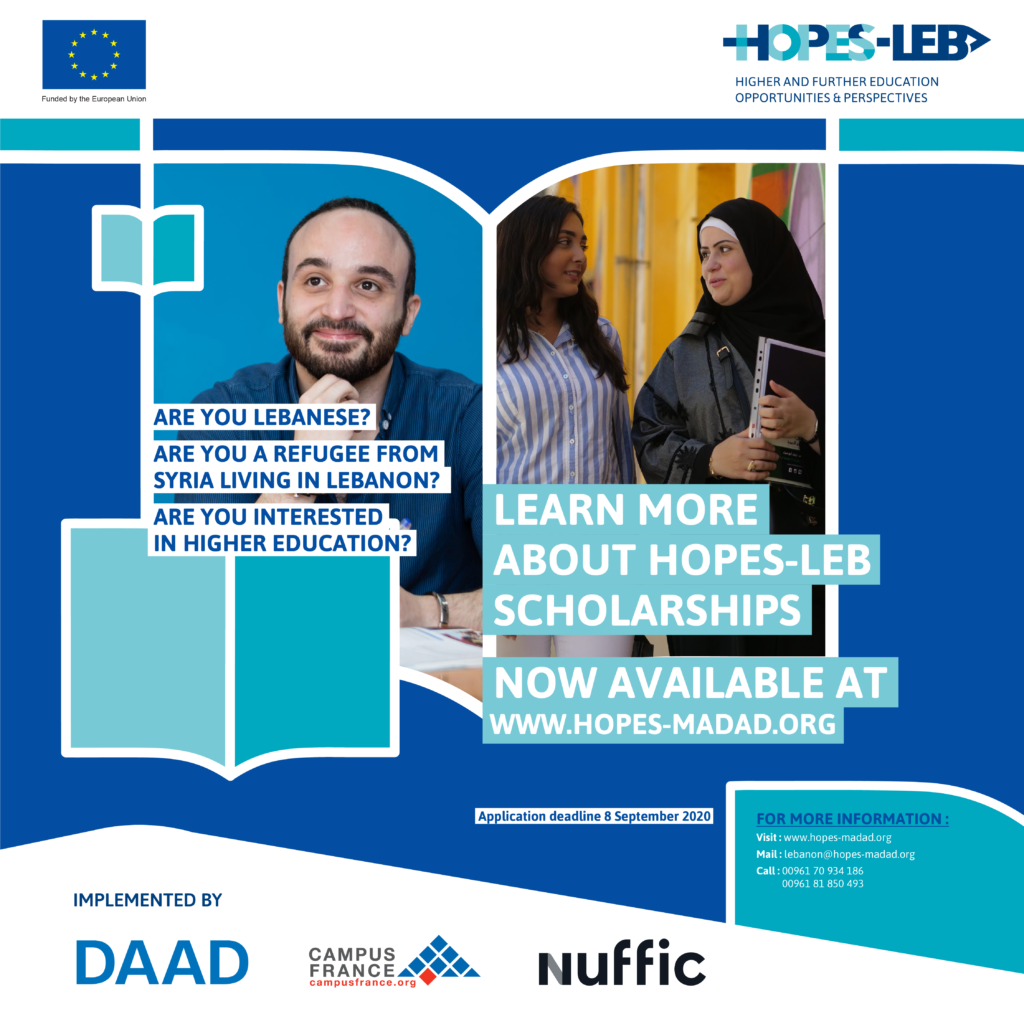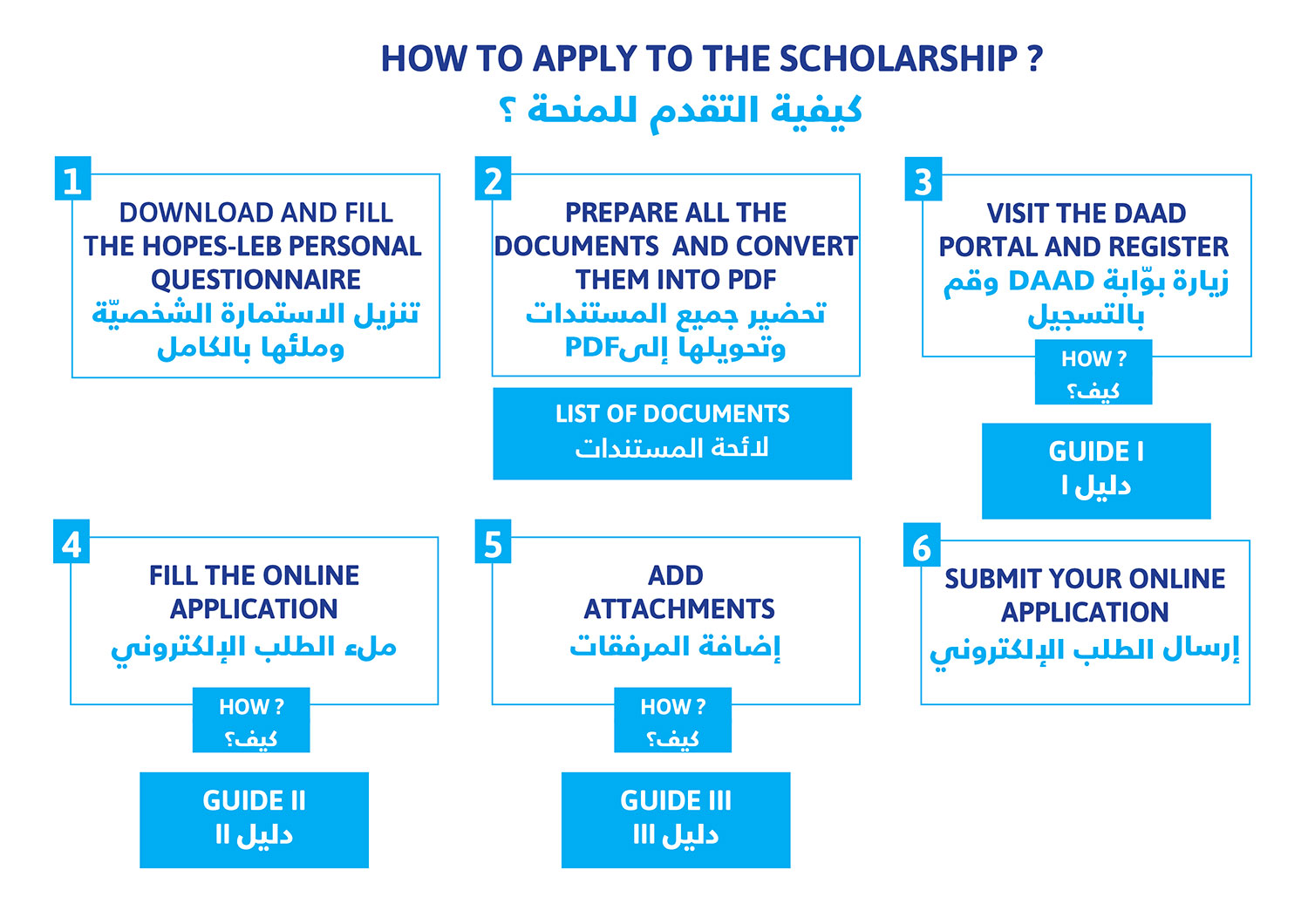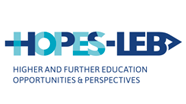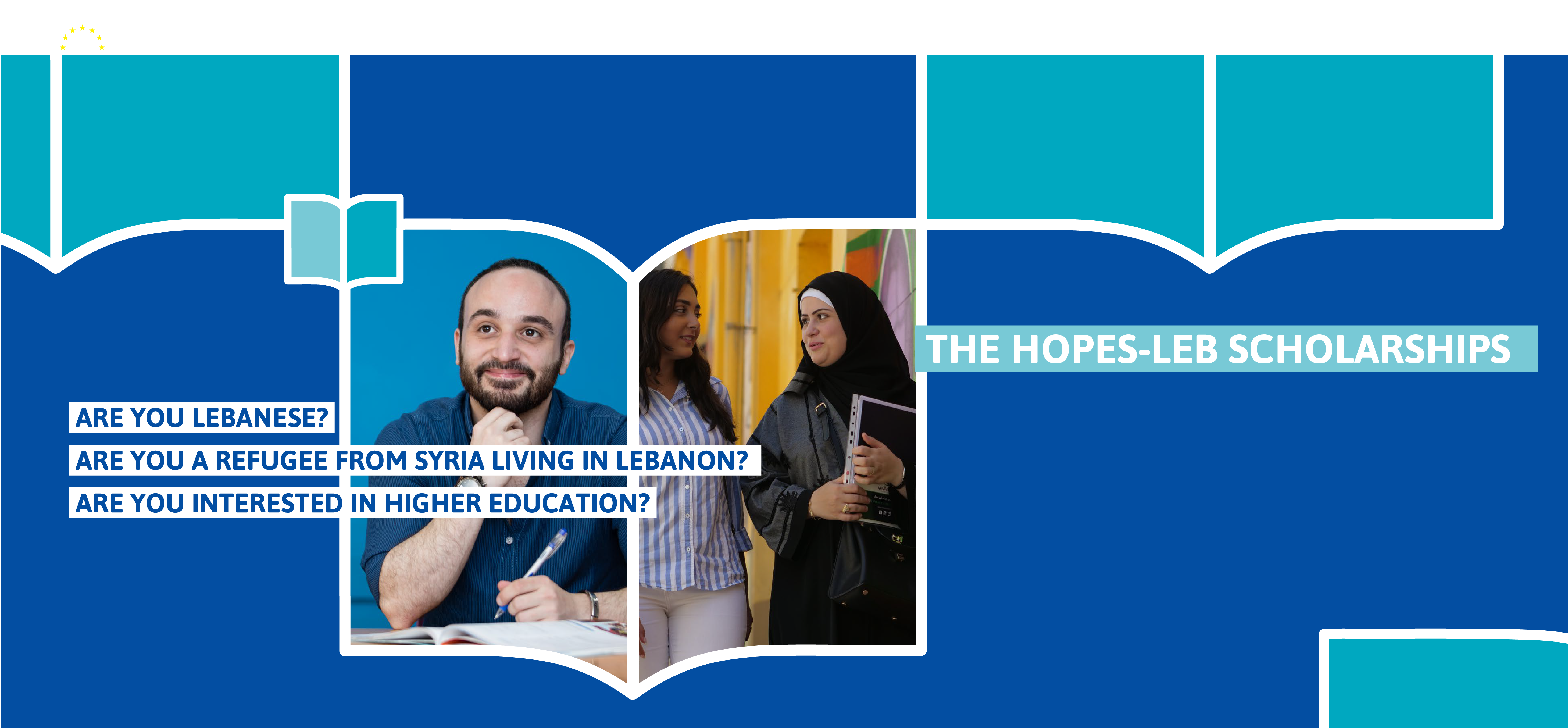HOPES-LEB Scholarship Programme for Master and Bachelor Studies|Funded by the European Union in Lebanon
The project HOPES-LEB (Higher and Further Education Opportunities and Perspectives for Syrians and vulnerable youth in Lebanon), funded by the European Union, through the EU Regional Trust Fund in response to the Syrian Crisis, the ‘EU Madad Fund’ and implemented by the German Academic Exchange Service (DAAD) together with Campus France and Nuffic, is pleased to announce the opening of its scholarship programme for Lebanese and refugees from Syria in Lebanon.
The programme provides Lebanese youth and refugees from Syria of post-secondary age with the opportunity to access or continue higher education in Lebanon, thus increasing their chances for a better future.

What degrees does the scholarship cover and in which universities?
The first intake of the HOPES-LEB scholarship programme offers scholarships for graduate (Master) and undergraduate (Bachelor) studies for freshmen (study beginners) as well as already enrolled or graduated students.
The sponsorship will initially cover a period of one academic year, i.e. from September 2020 until July 2021, but might be extended.
The scholarships will be available for studies at the:
- Lebanese University (LU) for Lebanese and refugees from Syria applying for all majors at undergraduate (BA) and graduate (MA) levels.
- Lebanese International University (LIU) for refugees from Syria applying for graduate (MA) and last year of undergraduate (BA) for all majors except for pharmacy.

Who can apply for the HOPES-LEB scholarships?
1- Be
- a Lebanese who has no other means of support for obtaining the intended academic degree
- a registered/recorded refugee from Syria having arrived in Lebanon after March 2011
2- Belong to one of the following categories regarding the educational status reached:
- holder of a high school certificate valid for enrolment at Lebanese universities (Lebanese and refugees from Syria applying for first year at the university)
- Lebanese or refugee from Syria student enrolled in undergraduate (Bachelor) or graduate (Master) programmes at the Lebanese University (LU) with a good GPA
- Refugee from Syria student enrolled in undergraduate (final year of BA) or graduate (MA) studies at the Lebanese International University (LIU) with a good GPA
- holder of a Bachelor degree from a recognized university with with a good average wishing to pursue their studies at Master level (in case of non-Lebanese degrees, equivalency from the MEHE is necessary as well as a proof for meeting the LU’s or LIU’s admission requirements),
- graduates who have completed their bachelor studies (as described in the previous point ) not more than six years ago unless the admission regulations of the university should determine a shorter period.
Remark: the same condition applies to first year applicants (they are eligible if the interruption between high school and applying for the university does not exceed 6 years)
3- Not be currently a beneficiary of any other academic scholarship during the same time while benefitting from the HOPES-LEB scholarship for the academic year 2020-2021.
4– If refugee from Syria living in Lebanon, hold a valid registration certificate/recording number from UNHCR/UNRWA and have a valid residency permit in compliance with the Lebanese law and according to the regulations at LU and LIU.
- Women are especially encouraged to apply.
- Applicants with special needs are explicitly encouraged to apply.
What type of support is provided?
The sponsorship will initially cover a period of one academic year, i.e. from September 2020 until July 2021, but might be extended.
The scholarship covers the following:
- Annual registration/tuition fees for the academic year 2020-2021.
- Monthly living allowance for basic education-related expenses, such as books and transportation.
What are the documents needed to apply for the scholarship?
- HOPES-LEB personal questionnaire (in Arabic) to be downloaded (below)
- Recent photograph
- Copy of passport or ID
- Copy of the family record book
- Copy of the valid UNHCR/UNRWA certificate or any other proof of registration/recording document (Refugees from Syria applicants only).
- Copy of a valid residency permit (Refugees from Syria applicants only). Remark: if the applicant is renewing his residency permit, he may submit an attestation of renewal from the GSO. In the absence of a valid residency permit, the applicant must provide us with a valid one once selected in the scholarship programme.
- Copy of a valid high school certificate or a valid attestation from MEHE (only for 1st year applicants)
- Copy of Syrian high school certificate (if refugee from Syria applying for 1st year at university)
- Equivalency from MEHE if holder of a Syrian high school diploma (only for first year applicants).
- Copy of grades of the secondary school level (1st year-2nd year and third year) (only for first year applicants) Remark: for the third year of the secondary school level, please provide the grades of the first semester and the others (if applicable) when called for the interviews.
- Transcripts of Bachelor or MA/MSc studies finished so far.
- Equivalency of university certificates in case of a non-Lebanese ones, valid for enrolment at the LU or LIU and in compliance with their regulations (provisional equivalency certificate can be submitted and to provide the one duly attested from MEHE at a later stage if called for the interview)
- Copy of the registration receipt at the Lebanese University or the Lebanese International University for the academic year 2019-2020 or any other document indicating the year of enrolment at the university such as the student ID or an attestation of attendance (ifadat tasjil we moutaba3a) (only for applicants already enrolled at university).For students applying for the first year at the university, please provide us with any proof of enrolment or acceptance from the respective faculty (if applicable). If not, you may provide us with a document (from the website) showing information about the relevant faculty in which you will be enrolled such as the address, the telephone number with the potential start date of the upcoming academic year if available. This document will serve you later when you reach the part of uploading the documents where you should submit a proof of admission needed to continue the online application.
- Copy of the Master thesis proposal approval (only for students starting their last year of studies).
- Copy of the thesis timeline signed by the supervisor (only for students starting their last year of studies).
- Recommendation letter from a university professor (only for students already enrolled at or having graduated from university).
Originals must be shown to the HOPES-LEB selection committee during the interview.

How to apply ?
- 1. Download the HOPES-LEB personal questionnaire and complete all the fields in Arabic
- 3. Visit the DAAD portal on this link: https://portal.daad.de/ and register on it
Check Guide 1 for further help in the registration process on the DAAD portal
- 5. Add all Attachments
Check Guide 3 for more help in uploading the documents
- 2. Prepare all the documents mentioned above and convert them in PDF
Please check the List of sample documents for further help
- 4. Fill the online application in English
Check Guide 2 for further help in completing the online application
- 6. Submit your online application
Please note that the scholarship programme of HOPES-LEB is administered by the German Academic Exchange Service (DAAD). That is why you need to register on the DAAD’s portal and upload your HOPES-LEB application there. This will allow you to stay connected with this renowned institution also after your HOPES-LEB scholarship and to benefit from the information and opportunities the DAAD provides for its former scholarship holders.
What are the selection procedures and criteria?
The selection will be based on two main criteria:
- academic quality (including feasibility of intended study project)
- personal vulnerability (i.e. need for support).
- Applications are received until 8 September 2020 (midnight) through the online application portal. It has to be mentioned that all applications received after midnight will not be taken into consideration.
- Applications are screened for completeness and compliance with basic requirements and eligibility criteria.
- Applicants who pass the eligibility check are shortlisted based on their prior academic performance and vulnerability as shown in the application form.
- The best shortlisted candidates will be invited for an interview with the HOPES-LEB selection committee to take place in late September/early October 2020.
- Interviewed candidates are informed on the committee’s decision by telephone and in writing after a decision has been made.
FREQUENTLY ASKED QUESTIONS
For more information:
For further inquiries about the HOPES-LEB scholarship, please contact us
- E-mail: scholarships@hopes-madad.org
- Telephone: +961 70 934 186 or +961 81 850 493 (calling time: Monday to Thursday between 10:00 am and 3:00 pm)
Learn more about the support of the EU Regional Trust Fund in response to the Syrian crisis, the EU Madad Fund:
The European Union strongly believes in investing in higher education, as an asset for the future of individuals and societies as a whole, especially in recovery and peacebuilding post-conflict processes. Young Lebanese and Syrians having sought refuge in Lebanon face a combination of hardships hindering their access to higher and further education. For this reason, the European Union has donated more than €70 million to provide young Syrians and disadvantaged youth from Iraq, Jordan, Lebanon, and Turkey with opportunities for higher and further education since 2015. More than 6000 youths, of whom 46% are women, benefit from this support, provided through the EU Regional Trust Fund in response to the Syrian crisis, the EU Madad Fund. More than 1500 Higher Education certificates have already been awarded to young graduates, with many more to come in the upcoming years.
Thanks to European Union support, the HOPES-LEB project will contribute to increase the number of young people, both refugee youths and host communities in Lebanon, being able to get a higher education and to improving their employment prospects. This will offer them better prospects for their future no matter where they are. In the context of the particularly difficult economic situation and the challenges experienced by many higher education institutions, this programme will contribute to alleviate the negative impact on the sector.





